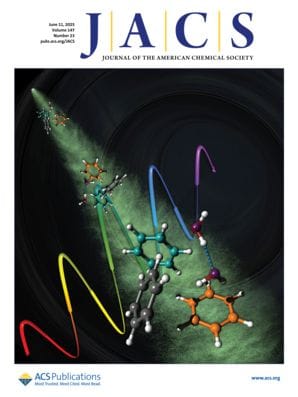ACS Editors Prof. Kelly Chibale (University of Cape Town), Prof. Heather Maynard (University of California Los Angeles), and Prof. Martin Zanni (University of Wisconsin Madison) were recently elected to the US National Academy of Sciences for their outstanding achievements in original research.

Every year, the US National Academy of Sciences (NAS) elects new members into this prestigious group. ACS Publications is proud to recognize three newly elected members to the NAS:
- Prof. Heather D. Maynard, Associate Editor, Journal of the American Chemical Society
- Prof. Martin Zanni, Associate Editor, Chemical Reviews
- Prof. Kelly Chibale, Editor-in-Chief, ACS Medicinal Chemistry Letters
These three ACS Publications journal Editors are among the 120 new members and 30 international members who were chosen for their distinguished and continuing achievements in original research.
Often considered one of the highest honors for a scientist, the NAS was established to recognize achievement in science by election to membership. Alongside the National Academy of Engineering and the National Academy of Medicine, it provides science, engineering, and health policy advice to the federal government and other organizations.
As of April 2025, there are now 2,662 active members, and 556 international members who are considered nonvoting members of the Academy. This newly elected cohort will be officially inducted into the NAS during a ceremony at their annual meeting in April 2026.
We had the chance to interview Prof. Chibale and Prof. Maynard. Learn more about their current research projects, what this award means to them, their vision on research in their field of chemistry, and insights on being an ACS Editor.
Jump to Section:
In Conversation with Prof. Kelly Chibale
In Conversation with Prof. Heather D. Maynard
In Conversation with Prof. Kelly Chibale
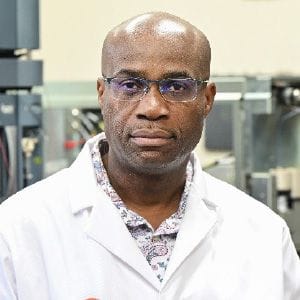
Kelly Chibale is a Professor of Organic Chemistry at the University of Cape Town (UCT) where he holds the Neville Isdell Chair in African-centric Drug Discovery & Development. He is also a Schmidt Sciences AI2050 Senior Fellow, Full Member of the UCT Institute of Infectious Disease & Molecular Medicine, founding Director of the South African Medical Research Council Drug Discovery & Development Research unit at UCT, Founder & Director of the UCT Holistic Drug Discovery and Development (H3D) Centre, and Founder & CEO of the H3D Foundation.
Prof. Chibale obtained his PhD in Synthetic Organic Chemistry from the University of Cambridge. This was followed by postdoctoral stints at the University of Liverpool and at The Scripps Research Institute. He was a Sandler Sabbatical Fellow at the University of California San Francisco, a US Fulbright Senior Research Scholar at the University of Pennsylvania School of Medicine, and a Visiting Professor at Pfizer.
Prof. Chibale is currently Professor of Organic Chemistry and Neville Isdell Chair in African-centric Drug Discovery & Development at the University of Cape Town in South Africa. His research interests include infectious disease drug discovery and the development of tools and models to contribute to improving treatment outcomes in people of African descent.
He also serves as Editor-In-Chief of ACS Medicinal Chemistry Letters.
What does being elected to US National Academy of Sciences mean to you?
As election to the United States National Academy of Sciences (NAS) is done by peers and based on “distinguished and continuing achievements in original research,” it means a lot to me. Coupled with the fact that my election to the NAS follows closely on my election last year in 2024 to the US National Academy of Medicine (NAM), makes it feel extra special!
Could you tell me about your team’s current research focus?
At the University of Cape Town, I wear two hats. One hat is leading our drug discovery centre H3D. The other hat is leading an academic research group supervising graduate (PhD) students and postdoctoral research scientists. In H3D we focus on infectious disease drug discovery. We integrate chemistry, biology and pharmacology, including drug metabolism and pharmacokinetics, to identify preclinical drug development candidates for malaria, tuberculosis and antibiotic-resistant microbial diseases. We also integrate artificial intelligence (AI) in our drug discovery programs and pharmacogenetics (aka pharmacogenomics) research by coupling AI to pharmacometrics modeling to tailor drugs for the genetically diverse African populations. On the other hand, my academic research group mostly focuses on medicinal chemistry and chemical biology of antimalarial agents as well as on the impact of drug metabolism mediated by Mycobacterium tuberculosis, the causative agent of tuberculosis, on clearance of co-administered drugs in patients with co-morbidities. In malaria we conduct mechanism of action studies through target identification. Our focus is on target deconvolution for anticancer kinase inhibitors demonstrating whole cell potency active against the human malaria parasite Plasmodium falciparum to identify novel chemotypes and kinase targets.
What inspired you to pursue your field of research? How would you describe it to someone outside your field?
I have transitioned from synthetic organic chemistry to drug discovery and pharmacogenomics research. When I joined the University of Cape Town to start my independent academic and research career, I was inspired to use my training in synthetic organic chemistry to contribute solutions to address the high disease burden on my continent of Africa. I believe science is both for curiosity and solving societal challenges. To someone outside my field, I would describe my research simply as identifying safe and efficacious small molecules, which can be progressed into human clinical testing and to explore the impact of genetics on response to medicines in the genetically diverse African population.
What challenges did you have to overcome on your path to becoming who you are today?
I am a fan of that old cliché “Challenges are opportunities”! I believe that no single human being has a monopoly over challenges because every human being faces their own unique challenges, which must never be trivialized by another human being that is not facing the same exact challenges. It is all relative. My challenges have mostly been to do with moving to foreign countries from my home country of Zambia. When I moved to the United Kingdom, then to the United States of America and then to South Africa, I faced different challenges associated with adjusting to a new environment along with being in the minority.
What opportunities in your field excite you the most?
African pharmacogenomics research aimed at drug tailoring to the genetically diverse African populations and stratifying patients for clinical trials by exploring the impact of genetics on drug pharmacokinetics and efficacy. Africa, being the most genetically diverse continent, is a genetic gold mine for the benefit of humanity on planet earth.
Tell us about your vision as the Editor-in-Chief of ACS Medicinal Chemistry Letters.
My vision is to make the journal a globally diverse community of drug hunters of the future.
What message would you like to give to early career researchers studying drug discovery?
Prioritize humility to know what you don’t know about drug discovery and seek help from those who have walked the journey you are about to embark on. I did this by spending a sabbatical at Pfizer where I learnt what it takes to set up a drug discovery organization at the level of infrastructure, technology platforms, and scientific disciplines. Also remember to have a mindset shift to understand that drug discovery is an interdisciplinary team-based science where the project belongs to the team and not to the individual Principal Investigator (PI).
Apart from drug discovery research, what are you passionate about?
I am passionate about articulating the business case for science and scientific entrepreneurship, to use science and scientific research to create jobs and career opportunities for young people who are the future.
In Conversation with Prof. Heather D. Maynard
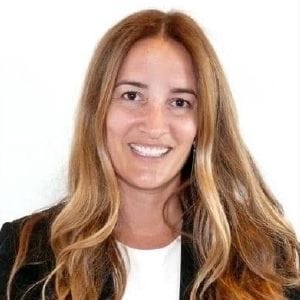
Heather D. Maynard is the Dr. Myung Ki Hong Professor in Polymer Science in the Department of Chemistry and Biochemistry and the California NanoSystems Institute at UCLA. Prof. Maynard is a leader in the area of protein-polymer conjugates, which are important therapeutics for a variety of diseases. She develops new synthetic methods to make the materials, invents new polymers to improve properties such as stability, and demonstrates preclinical efficacy of her conjugates with an eye towards translation for human health.
Prof. Maynard also works in the area of smart materials for precision medicine: materials that respond to disease states in the body. Her research and teaching have been recognized by numerous awards, including most recently the Bioconjugate Chemistry Lectureship Award, the American Chemical Society Arthur Cope Scholar Award, the UCLA Student Development Diversity, Equity and Inclusion Award, and election as an American Association for the Advancement of Science (AAAS) Fellow.
She is also an American Chemical Society POLY and PMSE, Leverhulme, Kavli Frontiers, and Royal Society of Chemistry Fellow, was a Fulbright Specialist in New Zealand, and a member of the US Defence Science Study Group. Prof. Maynard received her PhD from the California Institute of Technology and was an American Cancer Society Postdoctoral fellow at the Swiss Federal Institute of Technology (ETH). She also serves as an Associate Editor of the Journal of the American Chemical Society (JACS).
What does being elected to US National Academy of Sciences mean to you?
I am incredibly honored and excited to be part of the NAS cohort of esteemed scientists. The mission of the academy, especially furthering science in the United States and helping foster scientific understanding broadly, really resonates with me as a critical need.
Could you tell me about your team’s current research focus?
We identify gaps in the treatment of disease and utilize new chemistries and materials to address them. Recently, my team has been applying this strategy to address problems in diabetes and bacterial infections, particularly to prevent hypoglycemia (low blood glucose levels) using responsive nanoparticles that sense glucose levels and to mimic natural antibiotics called depsides.
What inspired you to pursue your field of research? How would you describe it to someone outside your field?
I find it invigorating to solve problems in medicine. I have long been interested in disease pathways, and it is like a fun puzzle to me to figure out how to address medical problems utilizing chemistry. It helps that I obtained my PhD from Nobel Laureate Robert Grubbs at Caltech who had broad interests and was curious; he supported me to study the biological activity of the polymers I was making. My postdoc at the ETH was with talented engineer, Jeff Hubbell, from whom I learned a lot about medicine. This gave me the background to do the work I am interested in today.
To someone outside my field, I make macromolecules that are safe for humans that can respond to the body and treat diseases when needed.
What challenges did you have to overcome on your path to becoming who you are today?
One challenge I encountered was that I went to UC Santa Barbara for my PhD in Materials Science, but my advisor moved to Germany. Thus, I pivoted and moved to another PhD program at Caltech, this time in Chemistry, helped by Profs. Fred Wudl and Brad Chmelka to obtain my research masters at UCSB. It did set me back a few years, but in retrospect, I learned a lot more about materials than if I had stayed in a chemistry program all along; thus, helping me in my career today.
What opportunities in your field excite you the most?
I am excited right now about marrying synthetic biology approaches with polymer chemistry to mimic natural molecules (like depsides) that are hard to synthesize. I am also excited about high throughput and robotic approaches to polymer synthesis. Both of these are being addressed by the NSF-funded BioPACIFIC Materials Innovation Platform that I co-direct.
What is the best part about being an editor at JACS?
I really enjoy reading diverse research not just “hot off the press” but even before press. It helps me keep up with the exciting, cutting edge research in my field, and keep a clear understanding of future research areas and trends.
What’s one piece of advice you would give to a researcher looking to publish in JACS?
Please send your best work to JACS; we look forward to reading it!
Stay Connected with Our Journals
Never miss an issue again! Never miss an issue again! Sign up now for email updates on future calls for papers, the latest articles, and other content from the journals featured in this article.
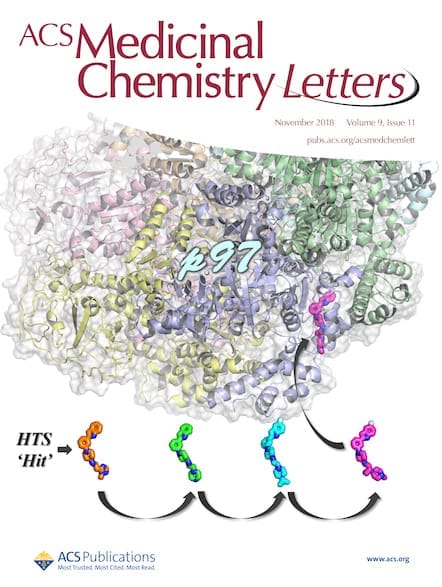
ACS Medicinal Chemistry Letters
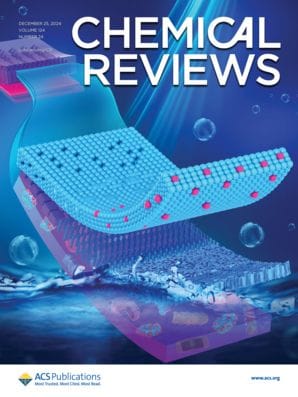
Chemical Reviews
